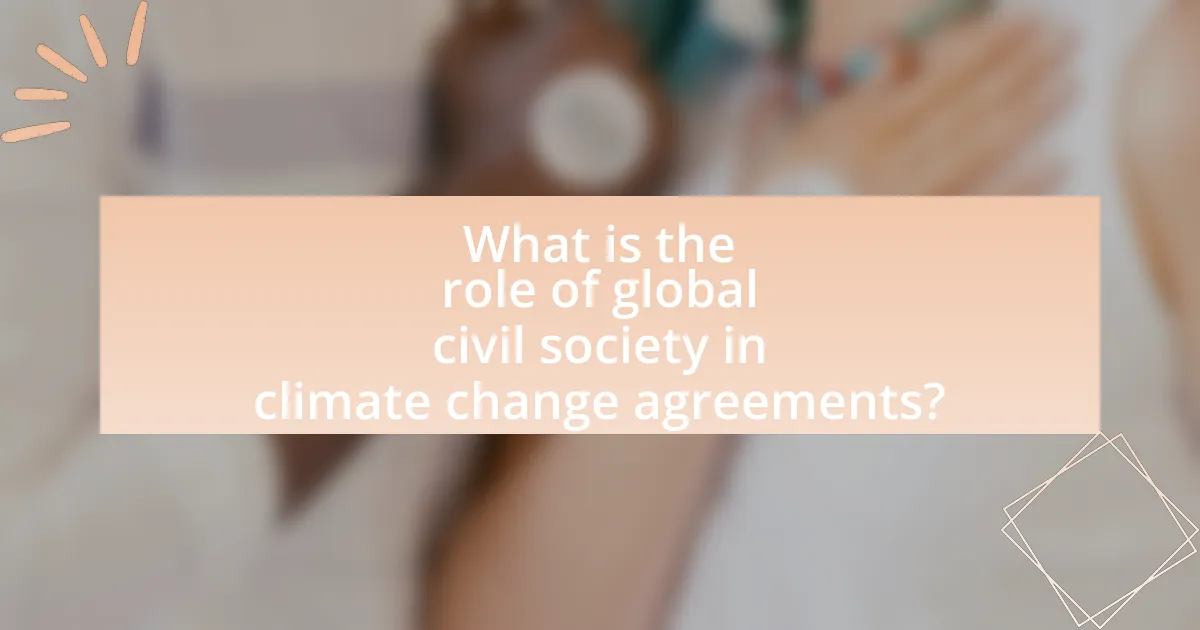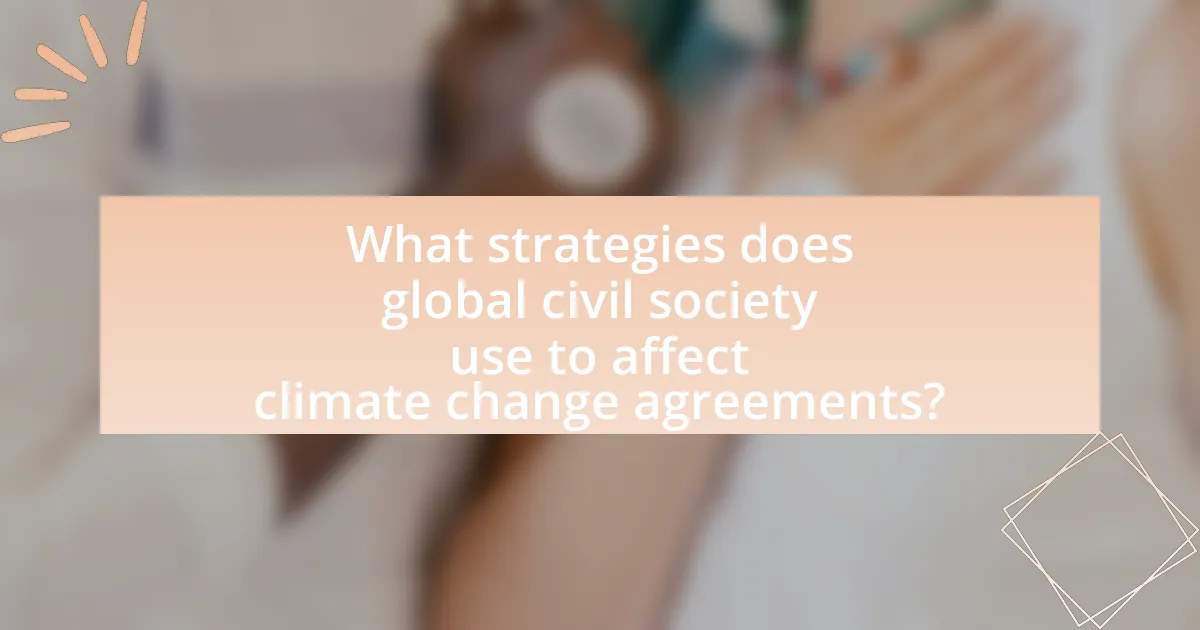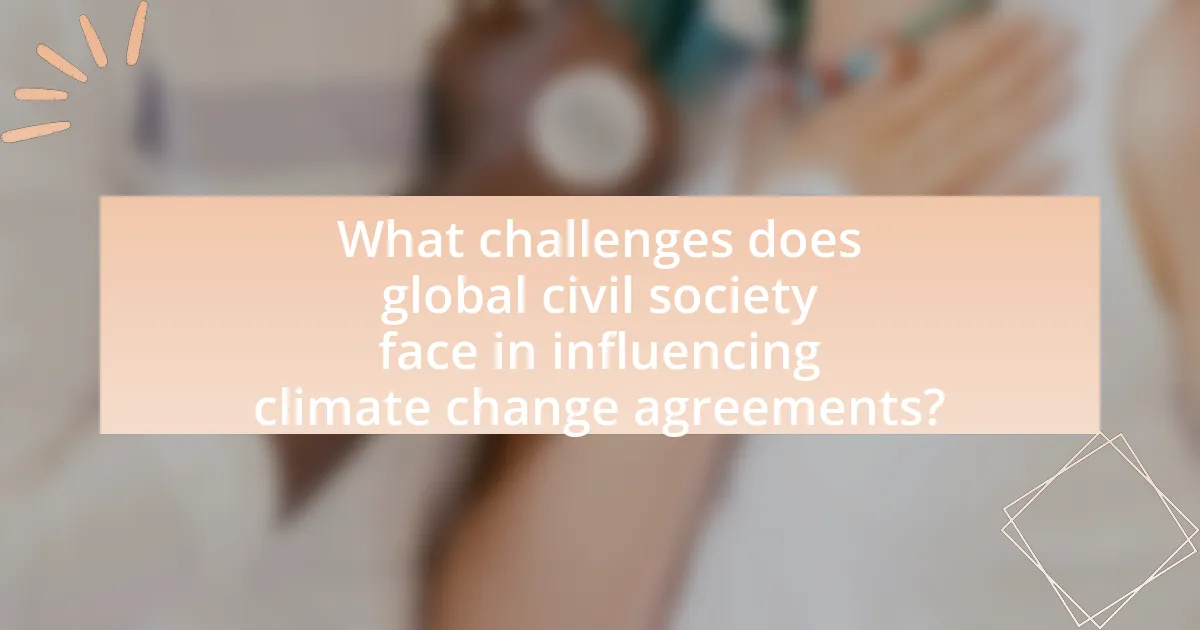Global civil society plays a vital role in shaping climate change agreements by advocating for environmental justice, influencing policy decisions, and holding governments accountable. Key organizations, such as Greenpeace and the World Wildlife Fund, mobilize public awareness and pressure policymakers to adopt ambitious climate action. The article examines how global civil society influences climate policy through advocacy campaigns, grassroots movements, and collaboration with governments, while also addressing the challenges these organizations face, including limited access to decision-making processes and funding constraints. It highlights the importance of public opinion and data in negotiations, as well as best practices for enhancing civil society’s effectiveness in climate advocacy.

What is the role of global civil society in climate change agreements?
Global civil society plays a crucial role in climate change agreements by advocating for environmental justice, influencing policy decisions, and holding governments accountable. Organizations within global civil society, such as non-governmental organizations (NGOs) and grassroots movements, mobilize public awareness and pressure policymakers to prioritize climate action. For instance, during the Paris Agreement negotiations in 2015, civil society groups significantly contributed to the discourse by emphasizing the need for ambitious targets and equity in climate action, reflecting the voices of vulnerable communities. Their involvement ensures that diverse perspectives are considered, ultimately shaping more inclusive and effective climate policies.
How does global civil society influence climate change policy?
Global civil society influences climate change policy by advocating for environmental justice, mobilizing public awareness, and holding governments accountable. Organizations such as Greenpeace and the World Wildlife Fund engage in campaigns that pressure policymakers to adopt stricter climate regulations. For instance, the Paris Agreement was significantly shaped by civil society’s push for inclusive climate action, as evidenced by the participation of over 1,000 civil society organizations during the negotiations. Additionally, public demonstrations and grassroots movements, like the Fridays for Future initiative led by youth activists, have raised global awareness and urgency around climate issues, compelling governments to prioritize climate action in their agendas.
What are the key organizations involved in global civil society?
Key organizations involved in global civil society include Amnesty International, Greenpeace, the World Wildlife Fund (WWF), and Oxfam. These organizations play significant roles in advocating for human rights, environmental protection, and social justice on a global scale. For instance, Amnesty International focuses on human rights issues, while Greenpeace is dedicated to environmental activism. The WWF works on conservation efforts and sustainable practices, and Oxfam addresses poverty and inequality. Collectively, these organizations influence policy-making and public awareness regarding critical global issues, including climate change agreements.
How do these organizations collaborate with governments and institutions?
Organizations collaborate with governments and institutions through partnerships, advocacy, and policy development. These collaborations often involve joint initiatives aimed at addressing climate change, where organizations provide expertise, research, and grassroots mobilization to influence governmental policies. For instance, during the Paris Agreement negotiations, various civil society organizations worked alongside national delegations to ensure that climate justice and equity were prioritized, demonstrating the effectiveness of their collaborative efforts in shaping international climate agreements.
Why is global civil society important in climate negotiations?
Global civil society is important in climate negotiations because it amplifies diverse voices, holds governments accountable, and drives public awareness and action on climate issues. Civil society organizations, including NGOs and grassroots movements, advocate for equitable policies, ensuring that marginalized communities are represented in discussions. For instance, during the Paris Agreement negotiations in 2015, civil society mobilized millions globally, influencing national commitments and emphasizing the need for climate justice. Their participation fosters transparency and encourages governments to adhere to their pledges, ultimately enhancing the effectiveness of international climate agreements.
What impact does public opinion have on climate agreements?
Public opinion significantly influences climate agreements by shaping political will and driving policy changes. When a substantial portion of the public expresses concern about climate change, governments are more likely to prioritize environmental issues in their agendas. For instance, the 2015 Paris Agreement was bolstered by widespread public support for climate action, which pressured leaders to commit to reducing greenhouse gas emissions. Research indicates that countries with higher public awareness and concern about climate change tend to adopt more ambitious climate policies, as seen in nations like Sweden and Germany, where public opinion has consistently favored strong climate action.
How do grassroots movements shape climate policy?
Grassroots movements shape climate policy by mobilizing public support, raising awareness, and influencing decision-makers through collective action. These movements often highlight local environmental issues, which can lead to broader policy changes at national and international levels. For instance, the global youth climate strikes initiated by organizations like Fridays for Future have significantly impacted political discourse and prompted governments to commit to more ambitious climate targets. Research indicates that grassroots activism can lead to increased public pressure on policymakers, resulting in legislative changes, as seen in countries that have adopted stricter climate regulations following widespread protests and advocacy efforts.

What strategies does global civil society use to affect climate change agreements?
Global civil society employs various strategies to influence climate change agreements, including advocacy, mobilization, and coalition-building. Advocacy efforts involve lobbying governments and international organizations to adopt stronger climate policies, often supported by research and data that highlight the urgency of climate action. Mobilization strategies include organizing protests, campaigns, and public awareness initiatives to raise consciousness about climate issues and pressure decision-makers. Coalition-building among diverse stakeholders, such as NGOs, grassroots organizations, and indigenous groups, enhances collective bargaining power and fosters a unified voice in negotiations. These strategies have been effective in shaping international climate agreements, as evidenced by the significant role civil society played in the Paris Agreement, where widespread public support and activism contributed to the commitment of nations to limit global warming.
How do advocacy campaigns contribute to climate action?
Advocacy campaigns significantly contribute to climate action by raising awareness, mobilizing public support, and influencing policy decisions. These campaigns educate communities about climate issues, leading to increased public engagement and pressure on governments to implement sustainable practices. For instance, the global “Fridays for Future” movement, initiated by Greta Thunberg, has galvanized millions to demand urgent climate action, resulting in policy discussions at various governmental levels. Research indicates that advocacy efforts can lead to substantial changes in legislation; for example, the Climate Action Network reported that coordinated advocacy led to the adoption of the Paris Agreement in 2015, showcasing the power of civil society in shaping climate policy.
What are the most effective advocacy strategies employed?
The most effective advocacy strategies employed by global civil society in influencing climate change agreements include grassroots mobilization, coalition building, and strategic use of media. Grassroots mobilization engages local communities to raise awareness and pressure policymakers, exemplified by movements like Fridays for Future, which has galvanized millions worldwide. Coalition building among diverse stakeholders, such as NGOs, scientists, and indigenous groups, enhances credibility and amplifies voices, as seen in the Climate Justice Alliance. Additionally, strategic use of media, including social media campaigns and traditional press, effectively disseminates messages and shapes public opinion, demonstrated by the viral impact of climate strikes and campaigns like #ClimateStrike. These strategies collectively create a powerful platform for advocacy, driving significant policy changes in climate agreements.
How do these strategies engage different stakeholders?
Strategies engage different stakeholders by fostering collaboration, enhancing communication, and promoting shared goals among diverse groups. For instance, climate change agreements often involve governments, NGOs, businesses, and local communities, each bringing unique perspectives and resources. By utilizing inclusive dialogue platforms, stakeholders can express their concerns and contribute to decision-making processes, which increases buy-in and accountability. Research indicates that participatory approaches, such as stakeholder consultations, lead to more effective climate policies, as evidenced by the success of the Paris Agreement, which incorporated input from various civil society actors, ensuring a broader commitment to climate action.
What role does research and data play in influencing climate agreements?
Research and data play a critical role in influencing climate agreements by providing the scientific evidence necessary to inform policy decisions and negotiations. For instance, the Intergovernmental Panel on Climate Change (IPCC) reports synthesize extensive research findings, offering a comprehensive assessment of climate change impacts, risks, and mitigation strategies. These reports serve as authoritative sources that guide negotiators in understanding the urgency and scale of climate action required, thereby shaping the terms and commitments of international agreements like the Paris Agreement. Furthermore, data on greenhouse gas emissions and climate trends enable countries to set measurable targets and track progress, ensuring accountability and transparency in climate action.
How do civil society organizations utilize scientific research?
Civil society organizations utilize scientific research to inform policy advocacy, enhance public awareness, and drive community engagement on climate change issues. By leveraging empirical data and findings from scientific studies, these organizations can effectively argue for evidence-based policies and practices that address climate challenges. For instance, research from the Intergovernmental Panel on Climate Change (IPCC) provides critical insights into climate impacts, which civil society groups use to mobilize support for international agreements like the Paris Agreement. This strategic use of scientific research empowers civil society organizations to influence decision-makers and promote sustainable practices within communities.
What types of data are most persuasive in negotiations?
Quantitative data, such as statistics and numerical evidence, are the most persuasive types of data in negotiations. This type of data provides objective, measurable proof that can substantiate claims and influence decision-making. For instance, studies have shown that presenting clear statistics about climate change impacts, such as the increase in global temperatures or the economic costs of inaction, can significantly sway stakeholders’ opinions and encourage agreement on climate action. Additionally, qualitative data, including testimonials and case studies, can also enhance persuasion by illustrating real-world implications and humanizing the data, making it more relatable and impactful in negotiations.

What challenges does global civil society face in influencing climate change agreements?
Global civil society faces significant challenges in influencing climate change agreements, primarily due to limited access to decision-making processes and the dominance of state interests. These organizations often struggle to gain a seat at the negotiating table, as governmental bodies prioritize national interests over global concerns. Additionally, funding constraints hinder their ability to mobilize resources and engage effectively in advocacy efforts. For instance, a report by the United Nations Environment Programme highlights that many civil society organizations lack the financial backing necessary to participate in international climate negotiations, which limits their influence. Furthermore, the complexity of climate policies and the technical nature of negotiations can create barriers for civil society groups, making it difficult for them to present their perspectives in a compelling manner.
What barriers exist for civil society participation in climate negotiations?
Barriers for civil society participation in climate negotiations include limited access to decision-making processes, inadequate funding, and lack of representation. Limited access arises from complex bureaucratic procedures that often exclude non-governmental organizations from meaningful engagement. Inadequate funding restricts civil society groups from effectively participating, as many rely on external financial support to attend negotiations and advocate for their interests. Additionally, lack of representation means that marginalized voices, particularly from developing countries, are often underrepresented, leading to an imbalance in the perspectives considered during negotiations. These barriers hinder the ability of civil society to influence climate agreements effectively.
How do political and economic factors hinder civil society efforts?
Political and economic factors hinder civil society efforts by creating restrictive environments that limit participation and funding. Authoritarian regimes often suppress civil society organizations through legal restrictions, censorship, and intimidation, which stifles advocacy and mobilization. Economically, funding cuts and resource scarcity can undermine the operational capacity of these organizations, making it difficult for them to engage effectively in climate change initiatives. For instance, a report by the International Center for Not-for-Profit Law highlights that in many countries, civil society organizations face increasing regulatory burdens that limit their ability to operate, thereby weakening their influence on climate policy.
What are the limitations of funding for civil society organizations?
Funding for civil society organizations is often limited by several factors, including dependency on external donors, restricted funding sources, and stringent reporting requirements. Dependency on external donors can lead to a misalignment between the priorities of the organizations and the interests of the funders, which may compromise the effectiveness of their initiatives. Restricted funding sources often result in a lack of diversity in financial support, making organizations vulnerable to fluctuations in donor priorities or economic conditions. Additionally, stringent reporting requirements can divert resources and focus away from core activities, limiting the organizations’ ability to respond flexibly to emerging issues. These limitations can hinder the overall impact of civil society organizations in influencing climate change agreements and other critical areas.
How can global civil society overcome these challenges?
Global civil society can overcome challenges in influencing climate change agreements by fostering collaboration among diverse stakeholders, including NGOs, grassroots organizations, and local communities. This collaboration enhances advocacy efforts, amplifies voices, and mobilizes resources effectively. For instance, the Paris Agreement in 2015 saw significant input from civil society groups, which helped shape the commitments of nations by raising awareness and pushing for accountability. Additionally, leveraging technology for communication and data sharing can strengthen networks and facilitate real-time responses to climate issues, as evidenced by the use of social media campaigns that have successfully mobilized public support for climate action.
What best practices can enhance the effectiveness of civil society in climate advocacy?
Best practices that can enhance the effectiveness of civil society in climate advocacy include building coalitions, leveraging data-driven campaigns, and engaging in policy advocacy. Building coalitions allows diverse organizations to unify their efforts, increasing their collective impact; for instance, the Climate Action Network has successfully mobilized over 1,300 NGOs globally to influence climate policies. Leveraging data-driven campaigns ensures that advocacy efforts are grounded in scientific evidence, which can enhance credibility and persuade policymakers; studies show that campaigns using robust data can increase public support by up to 30%. Engaging in policy advocacy through direct lobbying and participation in governmental processes enables civil society to influence decision-making directly, as seen in the successful inclusion of civil society voices in the Paris Agreement negotiations. These practices collectively strengthen the role of civil society in climate advocacy.
How can collaboration with other sectors improve outcomes?
Collaboration with other sectors can improve outcomes by leveraging diverse expertise and resources to address complex challenges, such as climate change. For instance, partnerships between environmental organizations, businesses, and governments can lead to innovative solutions that are more effective than isolated efforts. A study by the World Resources Institute found that multi-stakeholder collaborations can enhance policy implementation and increase public engagement, resulting in more robust climate action. This evidence demonstrates that integrating various perspectives and capabilities leads to improved strategies and measurable results in climate agreements.
What practical steps can individuals take to support global civil society in climate action?
Individuals can support global civil society in climate action by actively participating in local environmental initiatives and advocating for sustainable policies. Engaging in community clean-up events, tree planting, and conservation projects directly contributes to local efforts that align with global climate goals. Additionally, individuals can join or support organizations focused on climate advocacy, such as Greenpeace or the World Wildlife Fund, which work to influence international climate agreements. By educating themselves and others about climate issues, individuals can raise awareness and promote informed discussions, thereby strengthening civil society’s collective voice. Supporting legislation that prioritizes climate action, such as carbon pricing or renewable energy incentives, further empowers civil society efforts. According to a 2021 report by the United Nations, grassroots movements significantly impact climate policy by mobilizing public support and influencing decision-makers, demonstrating the effectiveness of individual actions in supporting global civil society.